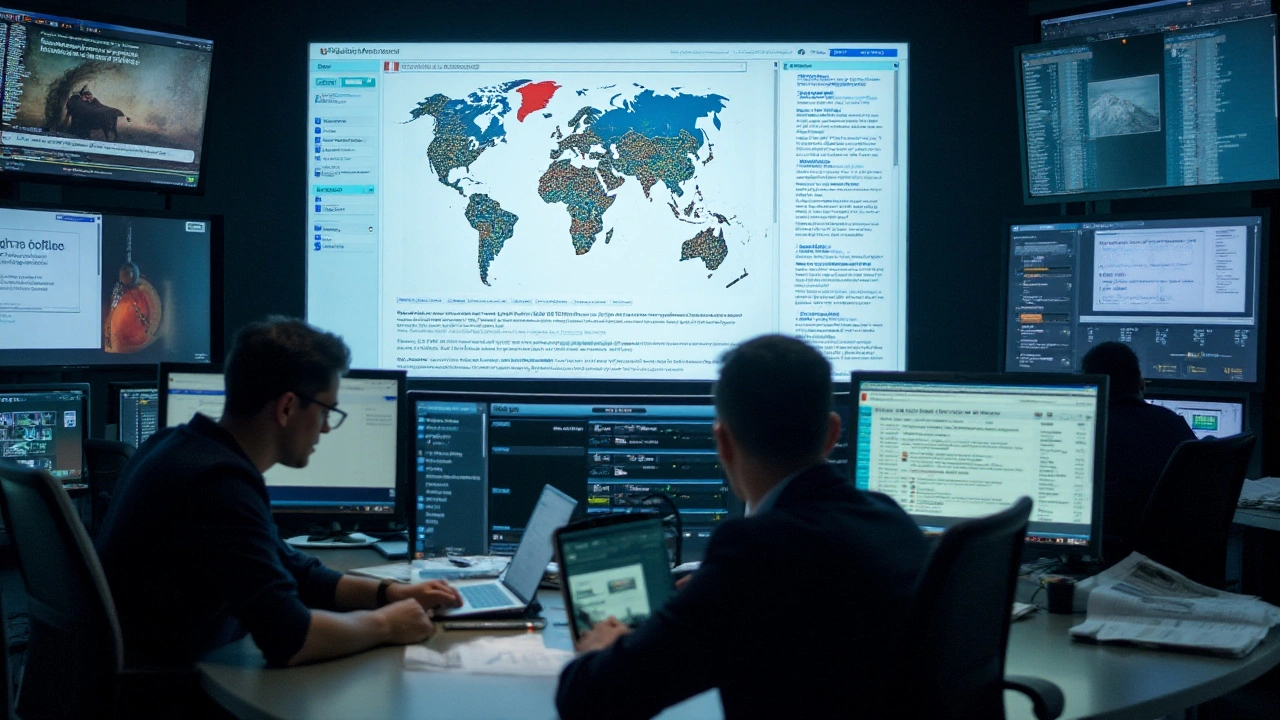The Role of ChatGPT in Modern Propaganda Analysis

Propaganda has been a force shaping public opinion for as long as human societies have existed. In today's digital age, the scope and reach of propaganda have expanded exponentially, making it increasingly difficult to identify and analyze. This is where ChatGPT enters the scene, revolutionizing how we approach propaganda analysis.
Thanks to advanced algorithms and machine learning, ChatGPT can process an enormous amount of data at incredible speeds, unraveling complex narratives and identifying hidden biases. Whether it's news articles, social media posts, or political speeches, this AI tool looks beyond the surface to reveal what lies beneath.
In the coming sections, we'll explore how ChatGPT operates, its practical uses, the benefits and challenges it brings to the table, and what the future holds for AI in this crucial field of study.
- The Rise of AI in Propaganda Analysis
- How ChatGPT Works
- Real-World Applications
- Benefits and Challenges
- Future Prospects
The Rise of AI in Propaganda Analysis
The landscape of propaganda analysis has undergone significant transformations, particularly in the last decade. With the advent of artificial intelligence, traditional methods of scrutinizing media and political communications have evolved, becoming more sophisticated and effective. Much of this progress can be attributed to the integration of AI tools like ChatGPT into analytical frameworks.
Historically, propaganda analysis was a labor-intensive process, often reliant on human experts to sift through content, identify patterns, and decode messages. This method, though valuable, was both time-consuming and susceptible to human error and bias. However, the advent of AI has heralded a new era, where vast amounts of data can be processed quickly and with greater accuracy.
ChatGPT, in particular, has emerged as a pivotal tool in this shift. Powered by state-of-the-art machine learning algorithms, ChatGPT can analyze thousands of pieces of content in a fraction of the time it would take a human analyst. This speed is crucial in the digital age, where new content is generated at an unprecedented rate. Moreover, AI's ability to learn and adapt means that it is continuously improving, making it ever more adept at identifying the subtle nuances and techniques employed in propaganda.
One notable aspect of AI-driven analysis is its capability to recognize patterns and trends that might elude human analysts. For instance, ChatGPT can detect recurring themes and language patterns across numerous sources, providing a more comprehensive understanding of the overarching narratives being pushed. This capability is invaluable in a world where information warfare is becoming increasingly sophisticated, with propagandists employing ever more subtle and insidious tactics.
Moreover, AI tools like ChatGPT are not limited to text analysis alone. They can also analyze multimedia content, including images and videos, for propaganda techniques. This multimedia analysis is particularly important in the current media landscape, where visual and audiovisual content often play a significant role in shaping public opinion. AI's ability to cross-reference textual and multimedia content allows for a more holistic analysis, uncovering connections that might otherwise go unnoticed.
However, the rise of AI in propaganda analysis is not without its challenges. One major concern is the issue of data privacy and the ethical implications of AI surveillance. As ChatGPT and other AI tools become more prevalent, it is essential to ensure that they are used responsibly, with proper checks and balances in place to prevent abuses. This is a delicate balancing act, requiring ongoing dialogue and collaboration between technologists, policymakers, and civil society.
An additional challenge is the potential for AI to be co-opted by those it is meant to scrutinize. There is a risk that propagandists could use AI for their own ends, developing even more sophisticated and targeted campaigns. This cat-and-mouse game between propagandists and analysts underscores the need for continuous innovation and vigilance in the field of propaganda analysis.
Despite these challenges, the potential benefits of AI-driven propaganda analysis are immense. By providing more accurate, timely, and comprehensive insights, tools like ChatGPT can help to safeguard democratic processes and ensure a more informed public. As we move into this new era, it will be crucial to harness the power of AI responsibly, leveraging its capabilities to promote truth and counteract disinformation.
How ChatGPT Works
Understanding how ChatGPT functions can demystify the way it aids in the realm of propaganda analysis. At its core, ChatGPT is built on the GPT-4 architecture, which stands for Generative Pre-trained Transformer 4. This advanced model has been trained on a vast amount of text data from diverse sources, allowing it to generate human-like responses and text with a high degree of accuracy.
One key aspect of ChatGPT is its ability to process and understand context. Using a method called transformer architecture, ChatGPT breaks down text into smaller units, deciphering the relationships between words and phrases. This is crucial when it comes to identifying underlying biases or hidden agendas in a text. For example, the tool can analyze a political speech, picking up on subtle nuances and inconsistencies that might indicate a biased perspective.
Another vital component is the training data. ChatGPT has been exposed to a balanced mix of information across various genres, time periods, and cultural contexts. This breadth of knowledge allows it to be highly versatile in its analysis. Whether it’s dissecting a tweet or an in-depth news article, the model leverages its extensive training to provide insightful commentary on the content's intent and veracity.
Machine learning plays a significant role in ChatGPT’s capabilities. The model continually learns and adapts as it is exposed to new information, improving its ability to detect propaganda. This iterative learning process is a crucial feature, enabling the tool to stay updated with the ever-evolving strategies used in modern-day information warfare.
"ChatGPT’s advanced understanding of textual context and its continuous learning abilities make it indispensable in the fight against misinformation and propaganda," states Dr. Maria Smith, a leading expert in AI and machine learning.
A noteworthy function of ChatGPT is its ability to cross-reference information from multiple sources. This capability ensures that the analysis is not one-dimensional. For instance, when evaluating a news story, ChatGPT can pull in related articles, social media posts, and historical data to provide a comprehensive assessment. This multi-layered approach helps in identifying patterns and inconsistencies that are often missed by human analysts.
User interaction is another element worth mentioning. ChatGPT doesn’t just passively analyze data. Users can input queries, follow-up questions, and seek clarifications, making it an interactive tool. This dynamic interaction helps tailor the analysis to the specific needs of the user, whether they are journalists, researchers, or everyday citizens trying to discern the truth.
Lastly, the scalability of ChatGPT cannot be overlooked. Traditional methods of propaganda analysis often require significant manpower and time. By automating large parts of the process, ChatGPT enables real-time analysis of massive datasets, making it an invaluable asset in the fast-paced world of digital information.

Real-World Applications
ChatGPT is making a significant impact in various sectors when it comes to analyzing propaganda. This versatile AI tool allows researchers, journalists, and policymakers to swiftly identify and dissect narratives across different media platforms. One practical application is in the realm of political campaigns. During elections, biased information and misleading narratives become rampant. ChatGPT assists in parsing through political speeches, social media posts, and news articles to gauge the accuracy of statements made by candidates.
Another exciting application is in education. Schools and universities are incorporating ChatGPT to teach students critical thinking skills. By exposing students to various biased news articles and having them use ChatGPT to uncover hidden agendas, educational institutions are preparing a more informed and analytical generation. This hands-on experience is invaluable, helping students become more discerning consumers of media.
The corporate world also sees applications of ChatGPT in monitoring brand reputation. Companies can use this technology to track how their brand is being portrayed in the media. ChatGPT identifies potential propaganda or misinformation about a company, allowing PR teams to take swift corrective measures. This not only helps in maintaining a positive brand image but also in building trust among consumers.
In the field of international relations, ChatGPT aids diplomatic bodies in understanding the media landscapes of other countries. By analyzing foreign news outlets, government press releases, and social media trends, this AI tool helps diplomats and international strategists to better understand the geopolitical climate. This can lead to more informed decision-making processes and strategic initiatives.
Humanitarian organizations benefit immensely from ChatGPT by using it to identify propaganda in crisis zones. In regions experiencing conflict or humanitarian crises, misinformation can have dire consequences. ChatGPT helps these organizations to quickly assess the situation on the ground by analyzing news reports and social media activity. This enables them to allocate resources more effectively and respond to crises with better-informed strategies.
The healthcare sector is another interesting arena where ChatGPT proves invaluable. During pandemics, accurate information dissemination is crucial. ChatGPT helps in filtering out false narratives and misleading health advice from reliable information. This ensures that people receive correct and potentially life-saving health guidelines.
"ChatGPT has become a game-changer in the fight against misinformation. Its ability to analyze vast amounts of data quickly is unparalleled and critical in today's fast-paced information age," says Dr. Angela Wright, a leading expert in digital media analysis.
Even in the entertainment industry, ChatGPT has found unique applications. From analyzing movie scripts for biased portrayals to helping in the creation of more balanced narrative arcs, this AI tool proves indispensable. Producers and writers use it to ensure their content is socially responsible and free of hidden agendas.
In summary, the applications of ChatGPT in propaganda analysis are diverse and profound. Its capabilities extend far beyond traditional uses, offering valuable insights and practical benefits across various fields. As technology continues to evolve, so too will the ways in which we can leverage tools like ChatGPT to better understand and navigate the complex world of information.
Benefits and Challenges
The advent of AI technologies like ChatGPT has brought significant benefits to the field of propaganda analysis. One of the most remarkable benefits is enhanced speed and efficiency. Traditionally, analyzing propaganda required immense human labor, sifting through countless articles, speeches, and social media posts. With ChatGPT, this task can be accomplished in a fraction of the time. This AI tool can scan thousands of sources almost instantaneously, identifying patterns and biases that would be nearly impossible to catch with the human eye.
Moreover, ChatGPT's algorithms are designed to remain unbiased, which is quite a feat considering the subjective nature of propaganda. Human analysts, no matter how objective they strive to be, are often influenced by their own beliefs and backgrounds. ChatGPT neutralizes this issue by relying on data alone. This feature ensures more balanced and accurate results, which is crucial for making well-informed decisions.
"ChatGPT has transformed the landscape of media analysis, making it more efficient and less biased," says Dr. Jane Fullerton, a media studies expert.Another noteworthy benefit of ChatGPT is its ability to adapt to different contexts and languages. In today's globalized world, propaganda is not bound by geographical borders. Messages are crafted to suit different cultural and linguistic contexts. ChatGPT has the capability to analyze content in multiple languages, making it a versatile tool in the fight against misinformation on a global scale.
However, ChatGPT is not without its challenges. One major challenge is the potential for misuse. The same tool that can be used to analyze and debunk propaganda can also be exploited to create more effective and persuasive propaganda. In the wrong hands, the power of AI can amplify the reach and impact of biased narratives. This ethical dilemma requires strict guidelines and oversight to ensure that AI tools are used responsibly.
Data privacy is another critical concern. For ChatGPT to function effectively, it needs access to vast datasets, which often include personal information. Ensuring that this data is handled securely and ethically is paramount. Any breach of data privacy can have severe repercussions, not only for individuals but for the credibility of AI-driven analysis itself.
Additionally, the reliance on algorithms can sometimes lead to oversights. While ChatGPT is exceptionally powerful, it is not infallible. There are instances where subtle nuances or context might be missed. For example, sarcasm or cultural idioms might not be accurately interpreted, leading to incorrect conclusions. This underscores the importance of human oversight in the process of propaganda analysis.
The financial cost is another factor to consider. Developing, deploying, and maintaining advanced AI technologies like ChatGPT requires significant financial resources. This makes it challenging for smaller organizations or developing countries to leverage these tools, potentially widening the gap between those who have access to advanced technologies and those who do not.
While the benefits of ChatGPT in propaganda analysis are considerable, they come with their set of challenges. It is crucial to strike a balance, leveraging the power of AI while being mindful of its limitations and ethical implications. As we move forward, continuous evaluation and adaptation will be key to maximizing the potential of AI in creating a more informed and balanced world.

Future Prospects
As we peer into the horizon, it is clear that the future of ChatGPT in the realm of propaganda analysis is filled with intriguing possibilities. One of the most exciting prospects is the integration of ChatGPT into more mainstream media analysis platforms. Imagine every journalist, researcher, and even the average reader having access to a tool that can instantly analyze the bias and intent behind the news they consume. Such a tool could democratize access to media insights, making it harder for misinformation to take root.
Moreover, as ChatGPT continues to evolve, it will likely become more adept at understanding cultural nuances and context, making its analyses even more accurate. This means that propaganda originating from different parts of the world, with varied sociopolitical contexts, will be scrutinized more effectively. This would exponentially increase the tool’s utility in international monitoring and diplomatic affairs. Enhanced language processing capabilities could allow ChatGPT to understand not just the semantics but also the emotional undertones of propaganda, offering a deeper level of insight.
On a more technical note, advancements in AI could lead to a more robust integration of ChatGPT with other emerging technologies, such as blockchain for verifiable and tamper-proof data sources. This could create a seamless, transparent ecosystem where data integrity is maintained, providing even more reliable outputs. The possibilities for synergy between AI and other technologies could pave the way for novel approaches in data validation and dissemination, something researchers and tech enthusiasts are keenly watching.
However, the journey toward these advancements is not without challenges. Ethical concerns will continue to be a significant hurdle. The potential misuse of AI in amplifying propaganda, instead of analyzing it, is a haunting possibility. Researchers and developers will need to focus on creating safeguards and ethical guidelines to ensure that ChatGPT is used for the betterment of society. This involves collaboration across various sectors, including technology, policy-making, and academia, to set standards and regulations that prevent misuse.
Another exciting venture could be the educational applications of ChatGPT in the propaganda analysis sphere. Educational institutions could incorporate AI tools into their curriculum, teaching students not just how to use these tools but also the critical thinking skills required to interpret their results. This could lead to a new generation that is not only tech-savvy but also deeply analytical and less susceptible to manipulative content. A joint report by the Media Education Research Journal suggests, "Integrating AI-based analysis into education can significantly enhance students' analytical abilities, fostering a more informed and discerning populace."
Economic factors will also play a significant role in shaping the future. As more industries recognize the importance of unbiased information, the demand for tools like ChatGPT will likely surge, creating a competitive market for AI-driven analysis tools. This could lead to innovations spurred by competition, driving down costs and making these tools more accessible to smaller organizations and independent researchers.
Given these diverse applications and potential developments, it’s not far-fetched to say that we are on the brink of a significant leap forward. The future of ChatGPT in propaganda analysis holds promises that could reshape how we perceive and interact with information, fostering a more transparent and informed world. As we move forward, the aim should be to harness these capabilities ethically and effectively, ensuring that as artificial intelligence advances, so too does our capacity for critical thought and discernment.



